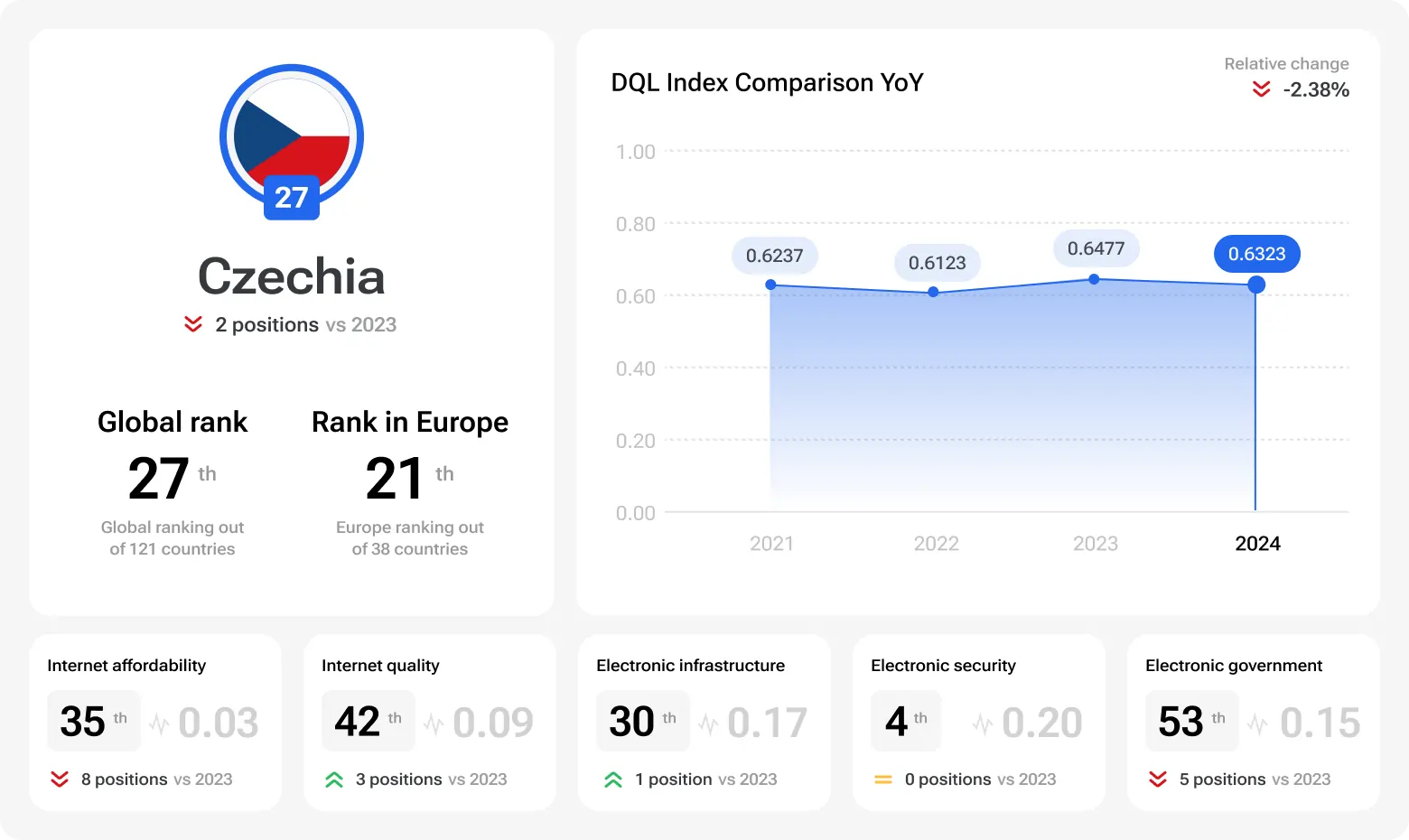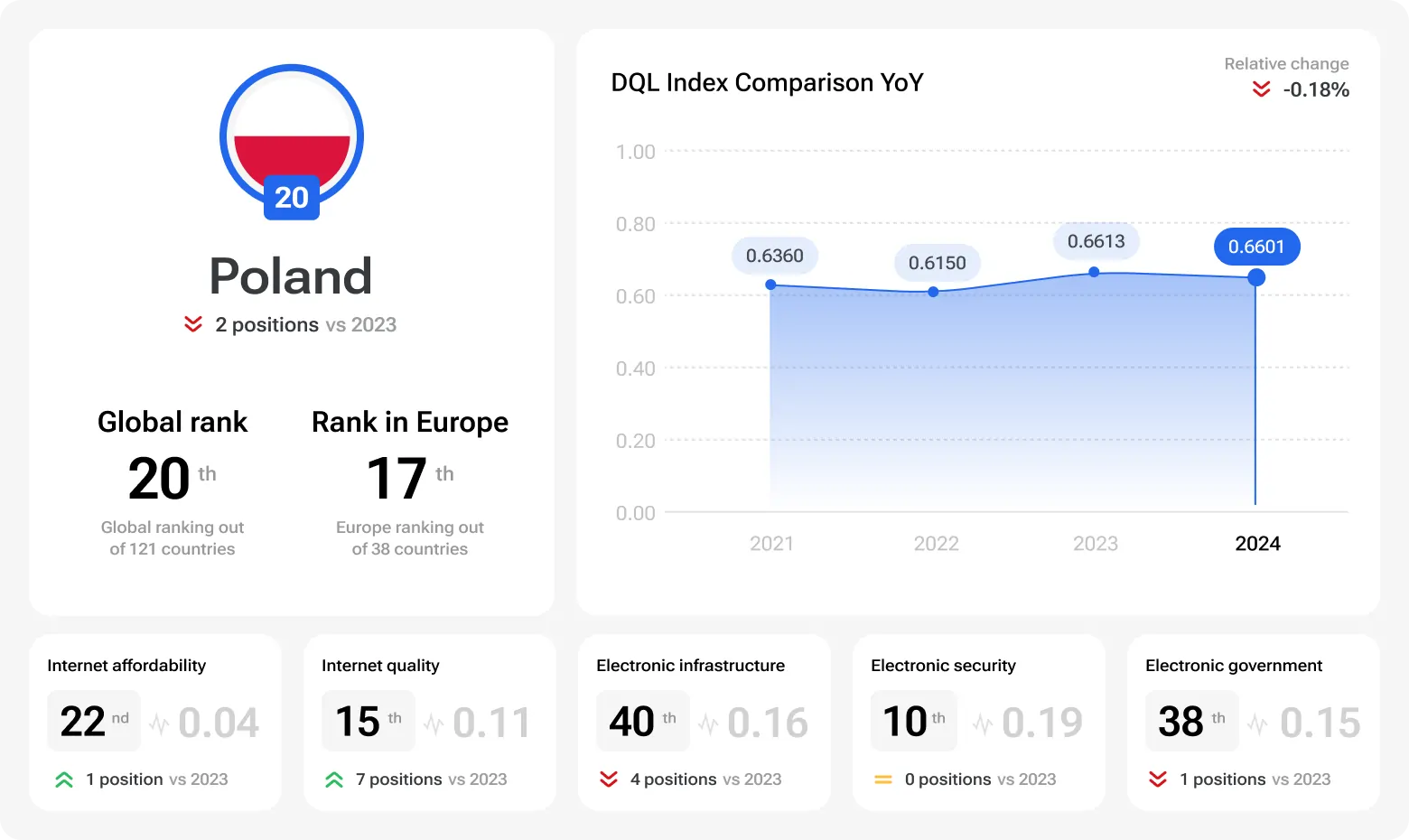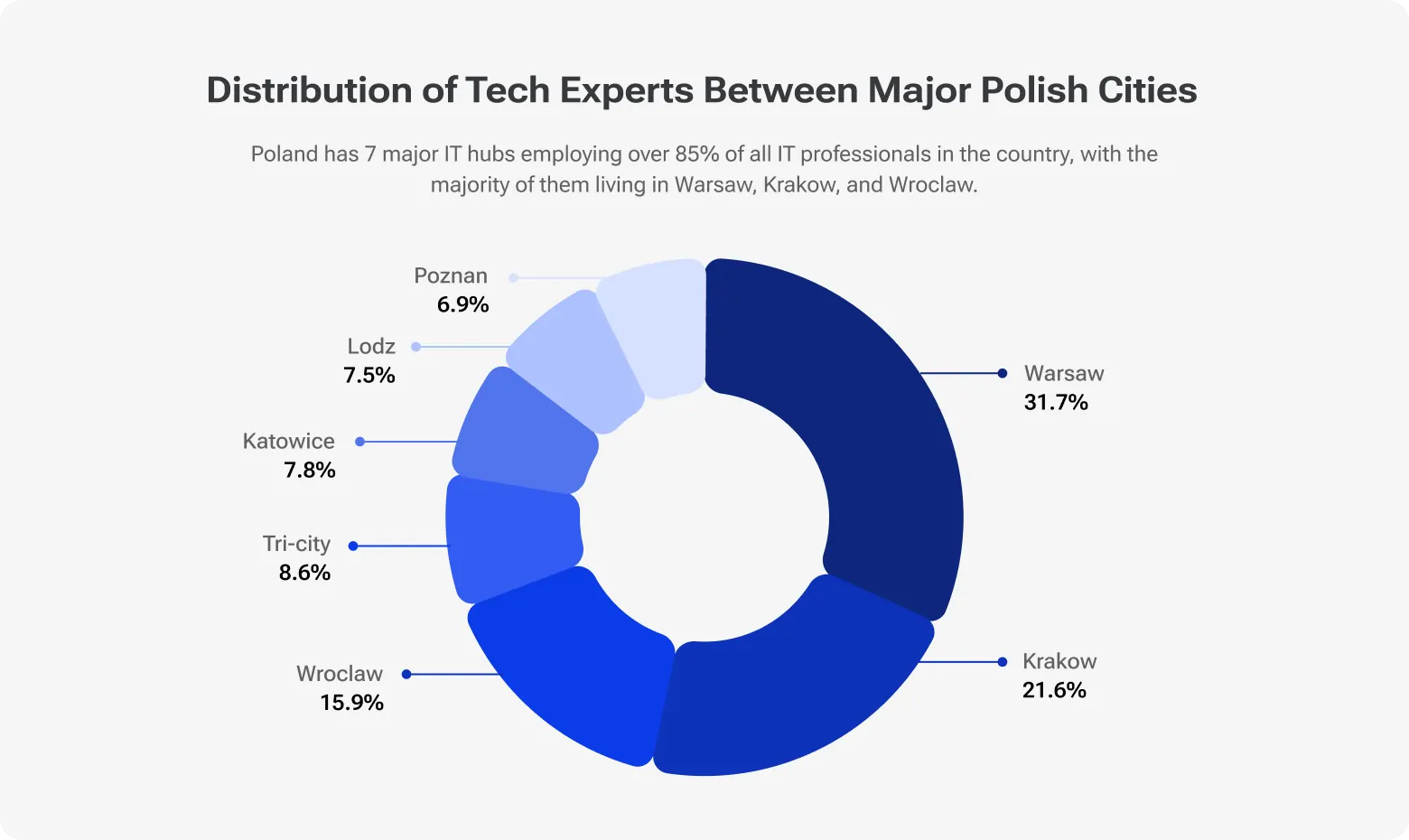IT outsourcing doesn’t live by India alone. These days, Central Europe is becoming a prominent player in the global IT outsourcing market, with the Czech Republic and Poland being the key outsourcing destinations in the region.
For those who consider outsourcing to Central Europe, deciding which of the two countries is better can be as tough as choosing between Lionel Messi and Cristiano Ronaldo. That’s why we’ve taken on the mission to help you make a choice. We’ll compare Czechia and Poland across talent availability, costs, cultural fit, ease of collaboration, and many other criteria.
Hire software developers in Czechia
Czech and Polish IT outsourcing markets overview
Let’s kick things off with a quick look at Central Europe’s two main IT outsourcing powerhouses. While both Czechia and Poland share EU membership, strong tech ecosystems, and stable economies, each brings its own strengths to the table.
IT outsourcing market size
Czechia: The Czech IT outsourcing market is growing. The revenue is estimated to reach $2.42 billion in 2025. Moreover, it is anticipated that the market will keep on expanding at an annual growth rate of 6.39% from 2025 to 2030.
Poland: Poland’s market is thriving too, and on a larger scale. Revenue from IT outsourcing is projected to hit $4.11 billion in 2025, with an expected yearly growth rate of 7.75% over the next five years. That puts Poland ahead in terms of both size and growth speed.
Software development outsourcing history for Czechia vs. Poland
Czechia: The outsourcing sector in Czechia started picking up pace in the early 2000s, boosted by its EU accession in 2004 and a strong foundation in engineering and math.
By the 2010s, Prague and Brno had made a name for themselves as European tech hubs, drawing in global players like Red Hat, Oracle, and IBM.
Among the recent trends, we’d like to highlight a strong focus on integrating AI, big data, and automation into outsourcing offerings, as well as the growing demand for nearshore outsourcing services.
Poland: Just like its rival, Poland began to see the rapid growth of the IT outsourcing industry after EU accession in 2004. Since then, it has grown into the largest IT outsourcing hub in Central Europe, where major international companies like Google, ABB, IBM, and Microsoft have established significant operations.
These days, as nearshore outsourcing in Europe is gaining momentum, 78% of Polish IT companies’ clients come from Western Europe. So, the nearshoring boom and an emphasis on cloud computing, AI, DevOps, cybersecurity, and game development can be defined as the key trends of the Polish market.
Digital infrastructure
Czechia: There is a modern digital infrastructure in Czechia. 96% of the population has access to 5G mobile networks. In fact, the country ranks sixth in the EU in terms of 5G coverage in rural areas, which is no small feat.
Yet, the Czech Republic is still catching up when it comes to fiber-optic internet. Fixed broadband coverage isn’t as strong as mobile, but local providers are working together to improve it.
On the bright side, cybersecurity is strong, and Czechia’s e-government services are well-developed. Citizens have access to digital IDs, secure document exchange, and other key online tools that make interacting with the government easy and safe.
Digital quality of life in Czechia
Poland: The country is known for its well-developed digital infrastructure. Nearly 96% of households have internet access, and 5G covers all major megapolises.
The country is also seen as a cybersecurity leader, with solid laws, fast incident response, and strong digital defenses in place.
Poland’s e-government services are among the most advanced in the region. Citizens widely use the gov.pl portal and the mObywatel mobile app to access public services, digital IDs, and official communication tools.
Digital quality of life in Poland
Czech and Polish economic situation in 2026
Czechia: The Czech Republic is a developed country with an advanced, high-income social market economy. In 2024, its GDP hit around $342.992 billion, putting it 47th in the world. A stable economy contributes to favorable business conditions in the country.
EU membership is an additional driver, due to which Czechia benefits from access to the single market and EU funding, fueling its trade and investment climate.
Poland: Today, Poland has a high-income, industrialized mixed economy that serves as the sixth-largest in the European Union and 20th in the world by nominal GDP, leaving Czechia well behind in size.
EU membership has been a major game-changer for the country, too. Since joining the union in 2004, Poland’s GDP per capita has grown nearly 40% above what it would have been without accession, thanks to EU funds and integration into EU supply chains.
Tech workforces
Czechia: Czechia may not be huge – just under 11 million people – but its tech talent is sharp. The country produces a lot of STEM grads, and its developers are known for being highly skilled and efficient. It ranks well in digital skills and productivity, which makes it a great choice for companies that care about quality over quantity.
Poland: Poland’s population is nearly twice the size of Czechia’s, which naturally means a larger and more diverse tech workforce. As the biggest IT outsourcing hub in Europe, Poland offers great scalability, which is great for companies that need to build or expand teams quickly without compromising on expertise.
Hire software developers in Poland
Cost of software outsourcing in the Czech Republic vs. Poland
Companies often turn to outsourcing not just to bring in top-tier specialists but also to optimize costs. Sure, getting skilled developers is great, but keeping budgets under control matters just as much. So, how much does it cost to hire developers in Czechia and Poland?
Hourly rates of software developers (€/hour)
Proficiency level
Czech Republic
Poland
Source: Cyaniclab
The rates in Czechia tend to be slightly higher than in Poland. There are several reasons why Czech vendors charge more:
The cost of living in the Czech Republic is higher than in Poland.
Czech has a smaller talent pool, and naturally, limited supply and steady demand lead to upward pressure on hourly rates.
The Czech talent pool skews more senior developers on average, driving rates up, but it also means you often need fewer people to get the same job done, which can balance things out.
Czechia’s outsourcing model leans toward smaller, high-efficiency teams that focus on quality and fast delivery, while the larger Polish market supports bigger, more scalable teams, which can offer lower per-hour costs for broader or long-term engagements.
In short, Poland offers lower rates, but Czech developers often make up for the higher cost with faster delivery and lower attrition, meaning less time and money spent on replacing team members.
Per-hour costs ≠ total cost of engagement
Whether you hire developers in Czechia or Poland, outsourcing isn’t only about the hourly rate. There are some key hidden costs to keep in mind:
Onboarding period
Before an outsourced developer can bring value, they need time to review the codebase, processes, tools, workflows, and business goals.
Where costs show up:
You’re paying for non-productive hours during knowledge transfer.
Your internal team members, like tech leads or PMs, spend time guiding, reviewing, and clarifying.
Sometimes there's a need for extra documentation, meetings, or even training.
So if onboarding takes 2–3 weeks, you’re paying for that time while not getting full output yet. Multiply that across multiple team members, and it adds up.
Management
Outsourced teams still need oversight. There should be someone to clarify requirements, review progress, handle scope changes, and resolve blockers.
Where costs show up:
Internal project managers or tech leads may spend 5–10 hours per week managing the outsourced team, including participation in standups, sprint reviews, retros, or syncs with the team.
So, even if your vendor’s rates are attractive, you’ll need to budget for your team’s coordination time as well.
Communication
When teams work not in the same office or even not in the same time zone, you may deal with lag, misunderstandings, and more meetings to stay on the same page.
Where costs show up:
Lost hours due to unclear requirements or misinterpreted feedback.
Rework when something is built based on the wrong understanding.
Tooling costs (Slack, Jira, Zoom, etc.) that support collaboration.
If 10% of their work time developers spent clarifying tickets, syncing on Slack, or fixing missteps, that’s 10% of your budget not going directly into product delivery.
Tech talent pool: Proficiency and availability
There’s no doubt that both countries have top-notch tech talent, but to help you decide, let’s compare Czechia and Poland developers.
While numbers may vary depending on the source, one thing’s for sure – the talent pool in Poland is indeed huge, with over 400,000 IT professionals. There are many software engineers, cybersecurity specialists, and data analysts. Fintech and enterprise software development are fields where Polish talent is particularly strong. A growing emphasis on cloud computing, AI, and blockchain indicates both the global demand and the country’s adaptability to emerging technologies.
More than 70% of Polish developers hold a higher education degree, and over 10,000 students graduate in information and communication technologies every year. That’s not surprising because Poland has reputable tech universities, with the Warsaw University of Technology and the AGH University of Science and Technology ranked among the best.
And what about Czechia? Sure, it may not match Poland in numbers, but it punches well above its weight when it comes to quality.
There are more than 217,000 ICT specialists in Czechia, and many of them are seasoned backend developers, AI engineers, and DevOps experts.
Additionally, about 4,000 ICT students graduate from the local universities annually. The Czech Technical University in Prague (CTU), the Brno University of Technology (BUT), and the Technical University of Ostrava are educational hubs that prepare highly qualified tech specialists. In fact, a strong academic background is one of the key strengths of Czech developers – what the country lacks in volume, it makes up for in technical depth.
In terms of English proficiency, both Czechia and Poland fall into the 'High Proficiency' category, ranking 25th and 15th, respectively, in the EF English Proficiency Index.
Both Polish and Czech local vendors are well-versed in remote work and international collaboration, offering reliable nearshore services to Europe and supporting clients across North America as well.
Legal nuances
Czechia and Poland are EU members, due to which both fully comply with GDPR and offer strong legal frameworks for data protection and privacy.
If you're outsourcing to either country, you can count on solid IP protection, enforceable NDAs, and well-established contract laws that align with EU standards – all the basics you’d want for secure, long-term cooperation.
When it comes to doing business, the two countries are almost neck and neck – Poland ranks 40th and Czechia 41st in the World Bank’s Ease of Doing Business ranking.
However, there are some slight differences if you look closer.
Poland tends to be a bit more bureaucratic. Things like business registration, tax filing, and general paperwork often involve more steps and time. Nothing super critical, but you may need additional internal effort or local legal support to keep things moving smoothly.
Czechia, by contrast, is known for its transparent legal environment and faster time-to-contract. Many companies find it easier to launch partnerships or set up operations here, thanks to more streamlined procedures.
One more aspect worth mentioning is R&D tax relief. Both countries offer it, but Poland pulls slightly ahead in this area.
In Poland, any business doing R&D, regardless of size, can deduct up to 200% of qualified R&D costs. Besides, there’s the IP Box incentive, which allows companies to apply a 5% tax rate on income from intellectual property like patents or software copyrights developed through R&D.
In Czechia, the setup is simpler. Companies can deduct up to 100% of specific R&D expenses from their tax base. It’s a solid benefit, just not as significant as what Poland offers.
All in all, both countries offer secure, business-friendly environments, but if your priorities are speed and simplicity, Czechia might give you a small edge. If you're looking to maximize R&D tax benefits, Poland is likely the better bet.
Communication and collaboration
It’s indeed important to understand what you can expect from Czech and Polish vendors when it comes to communication and collaboration.
Time zone
Timezone affects the collaboration between a client and a vendor. In these terms, Poland and Czechia are on equal ground - both are located in the CET zone, which means full sync with most of Europe and just enough overlap for early birds or night owls on the U.S. East Coast.
Work culture
This aspect of collaboration is often underestimated and considered only when mistakes are learned.
If you choose Poland, be ready for more formal and structured processes. Thus, you can expect clear roles, a bit of hierarchy, and meetings that actually stick to the agenda – yes, those still exist.
Czechia, in these terms, is more relaxed and collaborative – fewer job titles, more getting things done together. There is open dialogue, shared ownership, and less rigid hierarchy in the local teams.
Communication style
Communication is key, and you need to know how the styles of communication in Poland and Czechia differ.
Usually, Polish developers are pragmatic and detail-driven. They like it when things are done the right way, and any surprises in specs may rattle them.
Their Czech colleagues are more solution-oriented and proactive. They’ll raise red flags before serious problems come up.
Whatever country you choose, you’ll work with teams that adopt Western work culture. No bottlenecks – just clear communication, efficient collaboration, and the occasional emoji in Slack.
Guide to outsourcing software development to Poland
Scalability and long-term growth potential
IT outsourcing in Europe is thriving. With demand for top talent running high, it’s essential not only to find brilliant developers, but about keep them and build a team that can grow with you.
Poland, with its huge pool of IT specialists, is a solid pick if you plan to scale fast or run big enterprise-level projects. For example, if you need to assemble a fully-fledged, 20-person team in no time, Poland’s your best bet. The talent here is in abundance, and the hiring infrastructure is adjusted accordingly. In short, it’s like shopping at a tech talent megastore.
If you need high-quality, mid-sized teams, Czechia is a sweet spot. While not having an extensive talent pool, the country offers highly professional, tight-knit teams to tackle really complex tasks.
In terms of hiring speed, Poland is an obvious winner thanks to its size. However, it can feel a bit crowded. Big cities like Warsaw and Kraków are full of competition, which sometimes leads to higher attrition rates and developers jumping ship more often.
Czechia moves a little slower in hiring, but once local specialists are on board, they usually stick around. With such a low attrition rate, you may not worry about knowledge drain.
So if you assume rapid project growth, Poland’s a go-to. But if you value stability, loyalty, and specialized expertise, Czechia might just be the better fit.
Should you outsource software development to Czechia or Poland?
It doesn’t make sense to figure out whether Czechia or Poland is better. What is important is to understand which country fits your needs best.
Both have skilled tech talent and favorable business environments, but your decision should be based on what matters most to your project, whether it’s cost, value, speed, or scalability.
Czechia vs Poland outsourcing
Outsource software development to Czechia if
Outsource software development to Poland if
You’re looking for top-notch quality services and specialized skills
You need to scale swiftly and build large teams
Speedy contracts and streamlined setup matter
Cost efficiency and tax incentives are your priorities
You prefer a collaborative, flat work culture
You want access to a huge talent pool with diverse roles and skills
You’re managing a mid-sized, high-impact project
You’re running an enterprise-level or complex project
Stability and low attrition rates are key
You prioritize fast hiring even if the market is competitive
As a rule, Czechia is usually suitable for startups and tech firms looking for specialized teams in AI, DevOps, or backend development, where quality and team loyalty are worth the slightly higher hourly rates.
Poland, in turn, is a good choice for companies planning to build large development teams or launch complex enterprise projects.
Both countries offer solid, secure environments, so the choice depends on your goals, project scale, and the kind of partnership you want to build.
Wrap-up
What is the best country for outsourcing software development in 2026? Czechia or Poland? We must admit that both are exceptional outsourcing destinations, each with its own strengths. If you know your priorities, the choice will be pretty easy.
Whatever country you choose, Devico’s ready to support you. With on-the-ground experience in Czechia and Poland, we know how to get started smoothly and scale smartly.
Book a free consultation, we’ll help you turn your outsourcing plans into reality.






